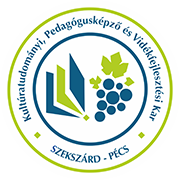Kutatási területek, szakcikkek II.
Schnell, Zs. – Zalay, Szabolcs – Gombás, Ildikó. (2023). Projektpedagógia a gyakorlatban – a VIZED projekt gyakorlati elemei és hatékonysága, mint a társadalmi változás csírája.
Kultúratudományi Szemle 2022/3-4. 80-90.
https://kpvk.pte.hu/sites/kpvk.pte.hu/files/kulturatudomanyi_szemle_2022_kesz.pdf
Magyar összefoglaló
A projektpedagógia egy gyakorlati példájának, a Pécsi Leőwey Klára Gimnázium VIZED projektjének elemeit és megvalósulását mutatjuk be. Ismertetjük a projektek alapvető elemeit és fázisait, melyek feltétlen szükségesek a projekt módszer didaktikai keretben történő alkalmazásához. A 21. századi kompetenciák felvázolásával bemutatjuk, a projekt metodika hogy támogatja e kompetenciák fejlesztését, mellyel az iskolák, oktatási intézmények társas kompetenciákkal rendelkező, kompetens embert nevelhetnek az életnek; a gimnázium pedagógiai programjának alapját képező, „homo studens” koncepciónak megfelelően. A projektmetodikában központi mozzanat a demokratikus szerveződés, melyben a pedagógus inkább moderátori szerepben van, szemben a hagyományos frontális szerveződésű osztálytermi gyakorlattal ahol az oktató alaptudást készen adó, magasabb rendű személy. A jelen tanulmányban bemutatott sikerrel megvalósított VIZED projekt környezetvédelmi és egészségre nevelő célokat szolgál, s ezzel a társadalmi változás csíráját hordozza magában.
English summary
Project pedagogy in practice – elements and efficiency of VIZED Project of Leőwey High School of Pécs, as a source for social change
The article describes the realization of a project in the framework of environmental and health education in Leőwey High School in Pécs. We outline the method’s basic steps and notions that ensure a valid and reliable pedagogical scheme, indispensable for the educative purpose of the project method. The skills developed in the method are listed, evaluated and described, all converging to enhance 21st century competencies with which one can educate competent individuals for the future, for life, an example of ‘homo studens’, aiming to raise wise and socially competent, knowledgeable individuals, humans for life. In this the recognition and support of individual inclinations is essential, where the educator takes the role of a moderator, rather than providing ready baked lexical knowledge as in the traditional frontal classroom setting. The article also describes the compulsory elements and phases of projects, thus gives a guide to further projects with applied nature and with educational potential to foster and bring on social change.



